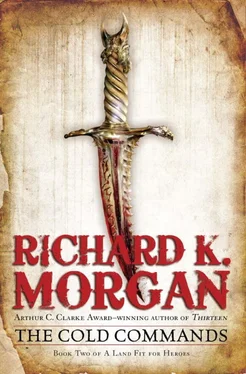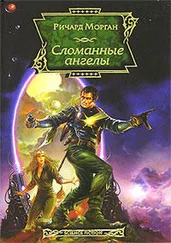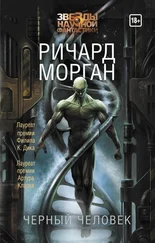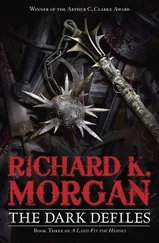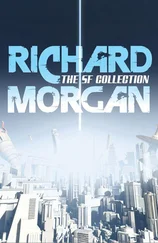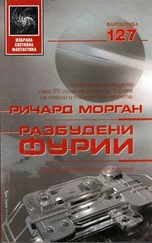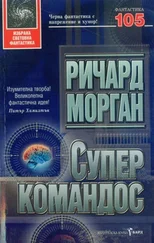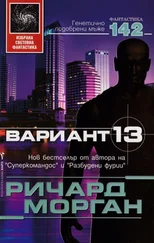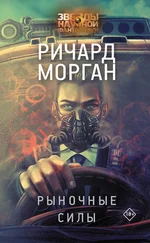“Some,” he said conversationally, “just wept.”
Beyond the collapsing ruins of the man he’d just gutted, he faced three more torch-and-steel-equipped figures. They were holding back now, aware of the corpses of their comrades littering the ground, aware that something serious was happening here. They huddled shoulder-to-shoulder and stared.
But behind them, others were coming.
The veteran settled his grip on the sword, angled it toward the gathering march-masters, and jerked his head for them to come ahead. Torchlight painted him massive and flicker-shadowed behind the blade.
He made them a grin from his scarred and ravaged features.
“Do I look like a fucking slave to you?” he asked them.
And though, finally, they would bring him down with sheer weight of numbers, none who heard him ask that question lived to see the dawn.
There was an iron alloy tree in one corner of the courtyard, gleaming where the late-afternoon sunlight played off features in the gnarled metal bark. Sharp black shadow ran out from the trunk like spilled ink, then split into branching rivulets that spread out across the stone paving, as if in search of something. Archeth sat well out of reach on the courtyard floor opposite—booted legs propped up in front of her, warmth of the sun-drenched courtyard wall at her back—and watched the rivulet shadows creep toward her. She bit into an apple she’d plucked from another tree in another courtyard, one that humans might have been a little more comfortable with.
Nothing grows at An-Monal , the superstitions whispered across Yhelteth like the wind. Nothing lives there .
Like most things humans believed, it was missing the point. The iron alloy tree was not alive in any conventional sense, true, but every year the blue-black leaves it lifted against the sky would rust through as winter approached, speckling and staining first to a purplish red, then to pale orange, and then finally to a stark silvery white that crumbled and turned to glinting ash in the breeze. And then, every spring, the leaves slid back out of the alloy bark like tiny blades unsheathing, like a winning hand of cards spread out on the table before your eyes.
The quiet metallic process had been going on for as long as Archeth could remember, which was coming up on a couple of centuries now; and—despite a slew of idiot prophecies about such things ceasing when the Kiriath abandoned the world—when the last of her people’s fireships did finally submerge in the An-Monal crater and something seemed to tear for good in Archeth’s heart, the tree never missed a beat.
She wasn’t really surprised, could have told the prophesying priests it was a stupid idea from the start. Her father’s people prided themselves on creating processes and artifacts that did not need them to officiate over.
We are what we build , Grashgal once told her cryptically, in the brief months between the end of the war and the Departure. Forces older and darker than knowing forced knowing upon us and long ago locked us out of paradise. There is no way back. The only victory against those forces is to build. To build well enough that, when we look back along the path of exile we have engineered, the view is bearable .
If there’s no way back , she begged him, then why are you leaving?
But by then it was a rancid argument. Grashgal could no more sway the Council of Captains than she could herself. The aftermath of the war had broken something in the Kiriath, had horrified them in some way that was still mostly obscure to her. They wanted out. After thousands of years of settled inertia, they were making plans again, drawing charts and asking their machines for counsel their own delicately damaged minds could not provide. Down in the workshops at An-Monal, the welding torches raged blue-white again, and sparks cascaded vermilion and gold down the curved iron flanks of the fireships in dry dock. The Helmsmen stirred in their brooding, mothballed darkness, and pondered the questions put to them, and said it could be done.
Involuntarily, she glanced left across the courtyard, toward the arched entrance and the paths that wound down to the workshops beyond. Ghost memories of the clangor faded out as she came back to the present; sharp acid taste of apple on her tongue and the warmth of the sun on her skin. She’d been down to the workshops that morning, had wandered the deserted iron gantries and crane platforms, leaned there and stared at the few fireships left behind in the cobweb gloom, until the familiar tears, the ones she’d been biting back for months now, came welling up and spilled burning down her face like some Kiriath etching chemical she’d been careless with.
And left her emptied out, but feeling no cleaner inside.
It’s the krinzanz, Archidi . She’d quite consciously not packed any when she left the city this time. Two days away, three at worst—how bad could it be? Now she had her answer. If you will go on these wildly optimistic cold quit jags .
She cleared her throat. Took another bite at the apple and shaded her eyes against the lowering sun. The tree branched low, not much over head height for a human, and spread intricately tangled limbs upward and out—a dispersal derived not, Archeth knew, from any sculptor’s observation or skill, but from certain mathematical musings her father’s people had incubated in the hearts of their machines like song. She remembered swinging from those branches as a child, plucking at the emerging leaf blades one spring and being shocked to discover that they were burning hot to the touch.
She ran wailing to her mother at the time, got her burned fingers salved and bandaged, and when she asked questions, got the usual human explanation for these things.
It’s magic , her mother said tranquilly. The tree is magic .
Her father let her get well into her teens before he disabused her of that notion. Maybe because he didn’t want to hurt his wife’s feelings, maybe just because he found it easier to discipline Archeth—who was growing up tough and scrappy—as long as she believed he really was a necromancer burned black by his passage through the veins of the Earth. Though, truth be told, it hadn’t taken Archeth long to see through that one—if, for example, Flaradnam’s journey through the twisted places really had burned him black, then how did you explain her ebony skin when she’d never been allowed closer than a hundred feet to a lava flow or the crater’s edge at An-Monal? It made no sense, and sense was something that she clung to from an early age.
Then again, from that same early age, Archeth could also see there was something going on beneath the surface of her parents’ relationship, something that reminded her of the stealthy bubble and churn of the magma in the eye of An-Monal. The sporadic eruptions it occasioned scared her, and she knew that magic was one of the subjects that would invariably cause the tension to bubble over.
I have explained it to you , she heard him shouting one evening when she should have been in bed, but had crept out to read by the radiant globe on the staircase wall. No magic, no miracles, no angels or demons lying in wait for unwary human sinners. You will not fill her head with this ignorant dross. You will not chain her this way .
But the invigilators say—
The invigilators say, the invigilators say! Crash of something crystal flung at a wall. The invigilators lie, Nantara, they lie to you all. Just look around you at this piece-of-shit torture chamber of a world. Does it look to you like something ruled by a benign lord of all creation? Does it look as if someone’s up there watching out for you all?
Читать дальше
